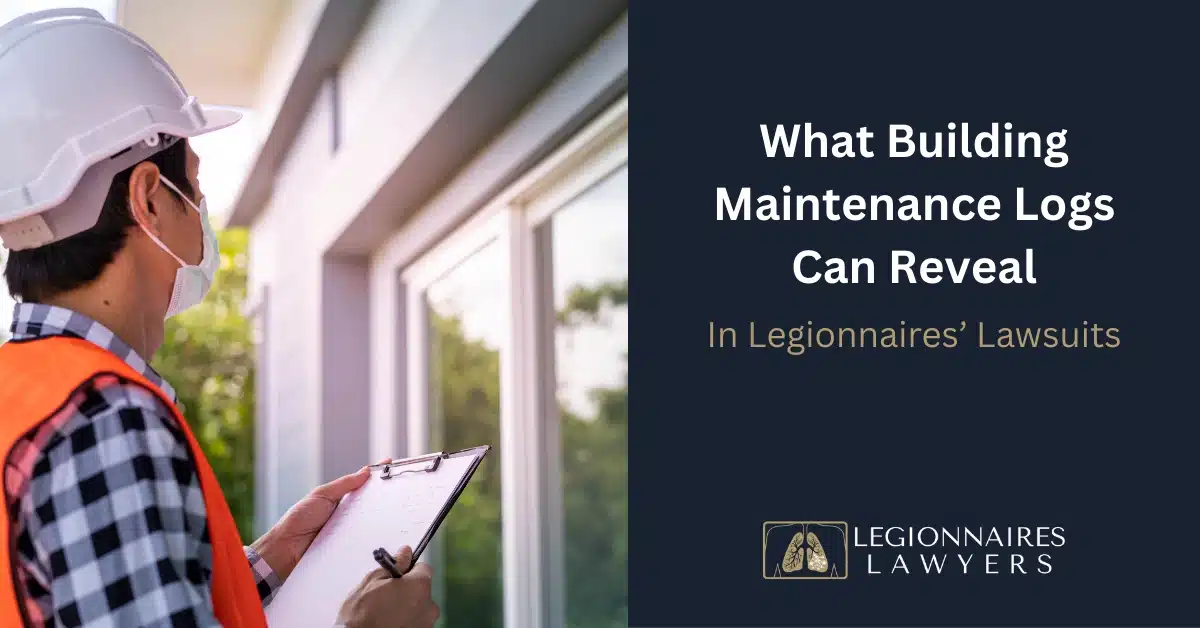
If you or a loved one has been diagnosed with Legionnaires’ disease after staying in a hotel, living in an apartment, or visiting a healthcare facility, it’s natural to wonder how this happened and, more importantly, who is responsible.
One of the most powerful tools in uncovering the truth behind a Legionnaires’ disease case is the building’s maintenance logs. These records can provide invaluable insight into whether the property owner or manager failed to properly maintain water systems, potentially exposing residents or guests to Legionella bacteria.
In this blog, we’ll explore how building maintenance logs can reveal negligence, determine liability, and serve as a key piece of evidence in Legionnaires’ disease lawsuits.
Understanding Legionnaires’ Disease and the Role of Maintenance Logs
Legionnaires’ disease is a serious and often severe form of pneumonia, caused by the Legionella bacteria that thrive in warm, stagnant water. The disease is typically contracted when someone inhales contaminated water droplets, which can come from sources like cooling towers, plumbing systems, or hot tubs. When these water systems are poorly maintained, bacteria can grow and spread, posing a major health risk.
For those impacted by Legionnaires’ disease, grasping the significance of building maintenance logs is essential. These logs keep track of key details about water system care, including inspections, cleaning schedules, and safety checks. By carefully reviewing these logs, it becomes possible to uncover whether the property owner or manager failed to fulfill their responsibility to maintain safe and hygienic water systems.
What Are Building Maintenance Logs?
Building maintenance logs are more than just a list of tasks; they’re your go-to record for tracking maintenance activities happening in a property. These logs are especially important for buildings with water systems like cooling towers, plumbing, or hot tubs– areas that are particularly susceptible to Legionella outbreaks. Keeping thorough maintenance logs is essential for ensuring the space stays safe and healthy for everyone.
Typically, these logs will include key details such as:
- Inspection dates
- Procedures followed
- Repairs completed
- Records of any issues found
By reviewing these logs, you can easily determine if property owners or managers are sticking to necessary maintenance schedules and safety protocols, helping to keep the risk of Legionella exposure at bay.
How Maintenance Logs Help Prove Negligence in Legionnaires’ Disease Cases
In a Legionnaires’ disease lawsuit, proving negligence is often the cornerstone of success. This is where maintenance logs become a crucial piece of the puzzle, offering strong evidence that the property owner or manager failed to meet their duty of care.
For example, if the logs show:
- Inconsistent inspections
- Failure to perform the required cleaning
It can clearly point to neglect in maintaining safe water systems. A lack of documented cleaning or skipped safety protocols can signal that the owner or manager didn’t take the necessary steps to prevent Legionella growth, which is key in proving negligence.
Furthermore, missing or incomplete logs can be a major red flag, indicating the property wasn’t properly maintained. This makes it easier to argue that those responsible failed to protect the health and safety of tenants and guests.
The Importance of Inspection and Cleaning Logs for Water Systems
Certain areas in a building, like cooling towers and hot tubs, are perfect breeding grounds for Legionella outbreaks due to their warm, moist environments. That’s why regular inspections and cleaning are essential to prevent the bacteria from spreading. When these activities are carefully recorded in maintenance logs, they can serve as powerful evidence in a Legionnaires’ disease lawsuit.
For example:
- A cooling tower maintenance log that shows consistent inspections and cleaning demonstrates that the building owner took the necessary precautions to prevent contamination.
- However, if the logs show long periods without cleaning or inspections, it highlights poor maintenance practices, which can increase the owner’s liability.
In many Legionnaires’ cases, having detailed and accurate inspection and cleaning logs is often the deciding factor in proving that the building owner’s negligence played a role in the outbreak.
How Building Maintenance Records Contribute to Legionnaires’ Disease Liability
In a Legionnaires’ disease lawsuit, one of the main goals is to prove liability. This is where maintenance records come into play, offering crucial evidence that links a Legionnaires’ disease outbreak to a building’s poor upkeep.
For example, if maintenance logs show that the building owner was aware of problems with the water system but failed to act, these records can clearly indicate negligence in maintaining safe water systems. Additionally, the logs can help establish a timeline, showing when Legionella bacteria may have entered the system and spread to the building’s occupants.
These records can become a part of proving the building owner’s negligence if there’s a pattern of:
- Inadequate maintenance
- Missing logs
- Ignored safety concerns
On the flip side, well-maintained logs showing regular inspections and cleaning can serve as evidence that the property owner took the necessary steps to prevent contamination, which is crucial in defending against liability.
Common Issues in Maintenance Logs That Can Affect Legionnaires’ Disease Claims
While building maintenance logs can be incredibly valuable in proving negligence, there are a few common issues that can diminish their effectiveness in Legionnaires’ disease lawsuits. Here are some of the most frequent problems:
- Incomplete records: Missing logs or gaps in the documentation make it difficult to establish a clear timeline and demonstrate whether proper maintenance procedures were followed.
- False or inaccurate entries: If logs contain false entries, such as overstated cleaning efforts or inspections, they can be used against the building owner in court.
- Failure to update records: Property managers sometimes fail to update logs with recent inspections, making it harder to track whether the building’s water systems were properly maintained.
These issues can seriously weaken a claim, so it’s essential to ensure that maintenance logs are thorough, accurate, and up-to-date.
The Role of Expert Witnesses in Analyzing Maintenance Logs
Expert witnesses are crucial when it comes to analyzing building maintenance logs and evaluating whether maintenance practices were truly up to par. Water system specialists, engineers, and other experts can dig into these records to see if the building owner followed the necessary procedures to ensure water safety.
For example, experts can:
- Check if routine cleaning protocols were actually followed
- Identify if the system’s design allowed for stagnant water to form
Their testimony can clarify complicated maintenance logs and provide the extra evidence needed to back up a claim for damages.
Why Building Maintenance Logs Are Critical for Legionnaires’ Disease Lawsuits
Building maintenance logs are an essential part of proving liability in Legionnaires’ disease lawsuits. These records help:
- Establish a timeline of key events
- Demonstrate whether the property owner followed safety protocols
- Provide critical evidence that negligence led to the outbreak
Without accurate maintenance records, it can be difficult to prove that the building owner failed to take reasonable steps to prevent contamination.
If you or a loved one has been affected by Legionnaires’ disease and you believe that building maintenance records may be key to your case, it’s crucial to consult with an experienced Legionnaires’ disease attorney. At Legionnaires Lawyers, we specialize in investigating Legionella-related outbreaks and fighting for compensation for victims.
Contact Us for a Free Consultation
If you believe building maintenance logs could be important for your Legionnaires’ disease case, don’t hesitate to reach out to our team for a free consultation. Let us help you navigate the legal process and secure the justice you deserve.
You May Have a Case. We’re Here to Help.
Free Consultation


